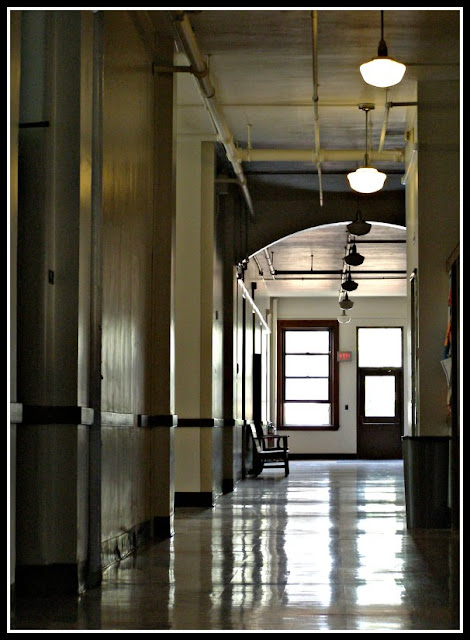-
"We've had this bookstore twenty years," said Phil. But it looks more like 100, or even 180, as long as Saugatuck has been a town. The upstairs Singapore Bank Bookstore reminds me of Shakespeare & Co. in Paris, another bookstore where books are piled and stacked like wood in the shed - whichever way they'll fit and not tip over. But something always does get knocked over, because the maneuverable space is so tight for us clutzy, star-struck customers.
Phil talked to me a good thirty minutes about how it is to live in a seasonal tourist town. We began talking about Gogol (I'm reading
Dead Souls, one of my two, or if I'm voracious three, novels a year) and ended up chatting about his old grill being replaced by a new one. He has to break down the old one so it can be hauled away by the recycling truck that comes by twice a year. The old hardware store a couple doors away recently closed, which makes Phil's household projects take longer than normal. "Now I have to plan trips to Menard's over in Holland thirty minutes away." It must have been getting close to lunch time because I bought Michael Pollan's
The Omnivore's Dilemma from Phil after our talk.
I had spent the previous night in Saugatuck, so I could wake up and get out to Oval Beach by 8am, before the fog dissipated (last post). Here is the town on the Kalamazoo River, which feeds into Lake Michigan a ways north of Oval Beach. In the summer you'd see yachts, fishing boats and ferries trolling along both directions.


It's pretty extraordinary that Saugatuck and nearby Douglas don't have strip malls or national stores. I had a tall coffee reading Gogol in Uncommon Grounds where the table lamps glowed and reflected on the windows looking out at a gloomy downtown, no Starbucks in sight. Saugatuck began as a lumber town, naturally as it sits on the Kalamazoo River, pouring right into Lake Michigan. This area fed trees to Chicago to rebuild after the great fire of 1871. But when the trees and lumbermen were gone, farmers cultivated peaches and other summer fruits for a wide market, and rustic natural beauty brought vacationers over from Chicago, about three hours away by car these days.
Lakeshore Drive in Douglas
In 1910 artists from the Art Institute in Chicago started the OxBow School of Art on OxBow Harbor north of town. I snuck around in my car until I found the campus, empty in the winter, except for me and the robins. They only house artists eight weeks in the summer. My grandparents, Grandma Olive and Grandpa Sidney, studied at the Art Institute together, and I wonder if they might have visited OxBow since it was begun in their era. Too bad they're not here to ask. Some of the old cottages (not in the picture below) have been fitted with high studio windows, just lovely. You can see the OxBow harbor behind the little found object sculpture in the upper right corner, below. Click on the image to get a closer look.

The town of Saugatuck has fewer than 1,000 permanent residents, like Phil and his glass sculpting wife Judy. During the summer when this becomes the Cape Cod of the Midwest, the town holds around 3,000. There are beautiful bed and breakfasts - including the Wickwood Inn owned by Julee Russo of
The Silver Palate cookbook, where Don and I have celebrated a few anniversaries and birthdays.
Besides the dunes and beaches, people come to see world class art displayed in more than a dozen galleries in Saugatuck and Douglas. I visited
one this time - the Water Street Gallery in Douglas. The Bruce Baughman painting, upper left corner below, was in the window of his own gallery on Main Street in Saugatuck.

Clockwise from top right: Sparrow, by Byron Gin; Saugatuck Dunes, by Anne Corlett Wiley;
glass piece title and artist unknown; title unknown, by Bruce Baughman
Of all the great eating places in these two towns, I couldn't resist a new combination: the first ever bowling alley here (in Douglas), where you can get a terrific burger (and any burger on the menu can be ordered as a veggie version, yay) and a martini. I had to try all that. I don't think I stopped smiling the whole time I ate my mushroom Swiss veggie burger and sweet potato fries while sipping a Cosmopolitan at the Lakeview Lanes bowling alley. I even bowled a very bad game and laughed at my form with my neighbors in the next lane.
I did all this in one day by myself in a needful retreat, which my kind husband recommended. Imagine a
week of good times you could have in the summer with someone as considerate as that - swimming, kayaking, eating ice cream and caramel apples from Kilwin's, lying in the sand, riding a ferry, shopping for one-of-a-kind jewelry or dishes or art, driving around looking at cozy cottages, lounging in your gorgeous bed and breakfast room Sunday morning over coffee while reading the paper, strolling the marina gawking at yachts with people eating lunch on them like it's normal, eating a picnic lunch listening to piped music from the Butler while watching boats on the river, shopping for antiques, collecting shells, stones and photographs.
-
-




























